
Year in Review 2006–07: Part 4
April 2007
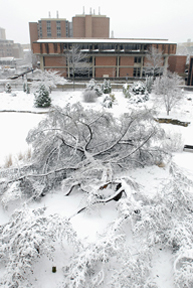
Heavy snow topples part of a 100-year-old tree on campus.
The Allen Centennial Garden’s 100-year-old Goff larch is threatened when a heavy snow breaks its trunk, but a closer inspection reveals that what’s left is well worth saving. A second life also is in store for the broken branches, which are turned over to a small business that salvages dying historic trees for reuse in custom furniture projects.
The Center for Integrated Agricultural Systems teams up with the REAP Food Group and other Madison-area farming interests to produce the 2007 Southern Wisconsin Farm Fresh Atlas, designed to make it easy to buy and eat locally grown food. All farms, businesses and organizations listed in the atlas have pledged to protect land and water resources, treat animals with care and respect, and provide safe working conditions for their employees.
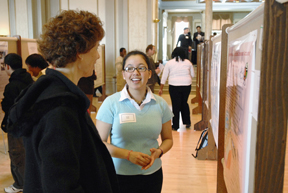
A student describes her research project during the ninth annual Undergraduate Symposium.
More than 200 undergraduate researchers from disciplines across campus present their projects at the ninth annual Undergraduate Symposium. Viewed as an important aspect of the “Wisconsin Experience,” conducting research provides students with a valuable learning opportunity, gives them a taste of the real world, and offers the chance to make important connections with faculty and researchers.
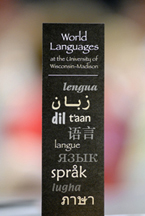
Students learn about world languages.
The university’s Language Institute hosts more than 700 high school students and their teachers for World Languages Day. With 17 of 25 participating schools coming from towns with populations of 10,000 or less, the day offers high school students from smaller communities the opportunity to experience languages and cultures from around the world. Participants choose from nearly 50 sessions on topics related to world languages, ranging from oral and literary traditions to music and clothing.
Giulio Tononi, a professor of psychiatry, shares findings about a new method to stimulate brain waves that characterize a person’s deepest stage of sleep, a discovery that could open a new window into the role of sleep in keeping humans healthy, happy and able to learn. The brain function in question, called slow wave activity, is critical to the restoration of mood and the ability to learn, think and remember.
May 2007
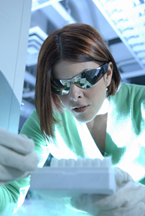
Some 50 UW faculty study stem cells and regenerative medicine.
In a move to strengthen and sustain its leadership in an emerging field, UW–Madison establishes a new Stem Cell and Regenerative Medicine Center. The center, operating under the joint auspices of the Graduate School and the School of Medicine and Public Health, will serve as a focal point for research in stem cell biology and regenerative medicine, a multidisciplinary field that seeks to develop technologies to repair or replace diseased or defective tissues or organs. As many as 50 UW–Madison faculty are engaged to varying degrees in this type of work.
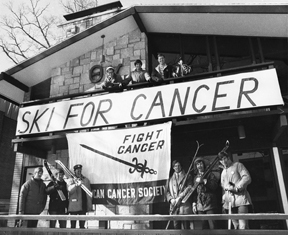
Theta Chi fraternity, shown in this 1970s photo of a fundraising ski event, is among campus Greek organizations celebrating 150 years on campus.
Greek organizations, which have nurtured some major success stories — including seven of the top 10 donors to the university — celebrate 150 years on campus. The first fraternity, Phi Delta Theta, was established in 1857 and Greek life grew rapidly as enrollment in the university increased after the Civil War. Sororities originated on campus in 1875 with the establishment of Kappa Kappa Gamma. Today’s organizations feature core values of service, scholarship, sisterhood/brotherhood and leadership.
In response to a request from Chancellor John D. Wiley, the adidas Group pledges new efforts to curb labor “blacklisting” and to help secure jobs for the former workers of one of its subcontractors, a now-closed apparel producer in El Salvador. UW–Madison contracts with adidas to provide uniforms and athletic equipment through 2011.
As alumnus and Broadway veteran André De Shields addresses spring commencement ceremonies, graduates include the first class of a unique engine-centered master’s program. Born out of a lunch conversation between UW–Madison faculty and industrial professionals, the Master of Engineering in Engine Systems program focuses on mid-career professionals who are looking to gain a broad knowledge of engines and uses an online format that allows them to maintain their careers while earning the degree.
Sean Carroll, professor of molecular biology and genetics, and Laura Kiessling, professor of chemistry and biochemistry, are admitted to the 144-year old National Academy of Science in recognition of their distinguished achievements and ongoing contributions to original research. Election to the academy is considered one of the most prestigious honors that can be bestowed upon an American scientist.
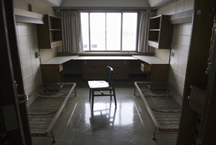
An Ogg Hall room stands empty, making way for East Campus Mall plans.
The last of tens of thousands of students to live in Ogg Hall pack up their belongings and leave their first home away from home. The two-tower, 13-story residence hall, which opened its doors in 1965, will be demolished to make way for green space along the East Campus Mall. The 425-bed Smith Hall, and a new 600-bed residence hall at Park and Dayton streets — which will retain the Ogg Hall name — were built to replace the outdated structure that has been a fixture of the campus skyline.
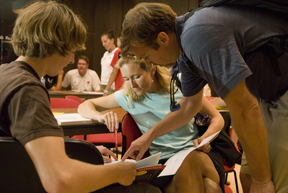
A new Parent Program helps parents stay involved with and informed about the college experience.
Given the increasing desire for parental connection to the college experience and more students wanting their parents involved, the university launches a new Parent Program that will take active steps to keep parents informed about key college milestones, provide bulletins on urgent campus issues, and serve as a central point of contact for existing parent services.
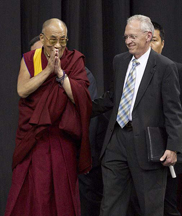
The 14th Dalai Lama of Tibet is escorted on stage by UW–Madison Chancellor John Wiley.
His Holiness Tenzin Gyatso, the 14th Dalai Lama of Tibet, speaks at the Kohl Center, marking his fifth visit to the Madison campus in the last three decades. He visited UW–Madison in 1981 and again in 1989, the year in which he won the Nobel Peace Prize. In May 1998, he addressed a large audience at the Kohl Center and received an honorary degree from the university. In May 2001, he met with UW scientists to conduct research on the effects of meditation on brain function, emotions and physical health.
From combating childhood obesity to creating a geriatric center serving Milwaukee’s Latino population, the Wisconsin Partnership Program distributed more than $16 million in grants in 2006, according to the program’s third annual report to the University of Wisconsin System Board of Regents. Funds for the program at the UW School of Medicine and Public Health came from the conversion of Blue Cross/Blue Shield to a for-profit organization.
June 2007
With a mix of innovative navigational and educational features, the interactive online map for the Lakeshore Nature Preserve is named “Best Web Site of the Year” by PlacesOnLine.org, a map-based Web portal sponsored by the Association of American Geographers. The site includes contemporary and historic images, interactive maps and rich historical accounts of the area.
Chris Solinsky, a senior from Stevens Point, Wis., successfully defends his NCAA 5K title at the 2007 NCAA Outdoor Championships in Sacramento, Cal. with a time of 13:35.12, edging out the next competitor by four seconds. The title makes five national championships for Solinsky during his collegiate career, the most ever for a UW male athlete.
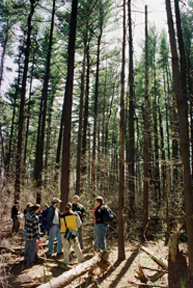
A merger forms the Department of Forest and Wildlife Ecology.
Wildlife ecology and forest ecology merge into one department to better address today’s natural resource challenges. The Department of Forest and Wildlife Ecology has 20 faculty members, plus instructional and research staff, and more than 200 undergraduate and graduate students. Wildlife ecology and forest ecology both have roots in a wildlife management department founded by Aldo Leopold in 1939, but the two units had existed separately for nearly five decades.
Racing and exhibiting a 20-foot, 176-pound boat named “Descendent,” the university’s concrete canoe team earns its fifth consecutive national title at the 20th annual National Concrete Canoe Competition sponsored by the American Society of Civil Engineers, besting 21 other teams. The win garners the team an invitation to participate in the 30th annual Dutch Concrete Canoe Challenge in the Netherlands in September.
A federally funded, state-administered screening and assistance program to fight substance abuse — the fourth leading cause of death in Wisconsin — is now offered at 20 clinics around Wisconsin. The program, based in settings as varied as inner-city Milwaukee, the rural northwest and two tribal health clinics, is run by the Wisconsin Initiative to Promote Healthy Lifestyles. During the next five years, the clinics are expected to provide an initial screening to some 100,000 patients ages 18 and older. Numerous studies have found the program to be effective in early detection of substance abuse.
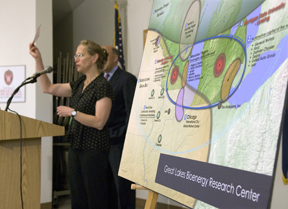
Campus and state officials unveil a historic grant to study the potential of bioenergy.
A consortium of universities, U.S. Department of Energy national laboratories and businesses led by UW–Madison to explore the vast potential of bioenergy is awarded one of three major new bioenergy research centers. The award of approximately $125 million during five years establishes the DOE Great Lakes Bioenergy Research Center, where scientists and engineers will conduct basic research toward a suite of new technologies to help convert cellulosic plant biomass — cornstalks, wood chips and perennial native grasses — to sources of energy for everything from cars to electrical power plants. The new grant, the largest formal grant in the university’s history, is part of a larger Wisconsin Bioenergy Initiative, a statewide effort focused on the development of fuel and energy resources from non-food sources in ways that promote regional economic growth in the context of good environmental stewardship.